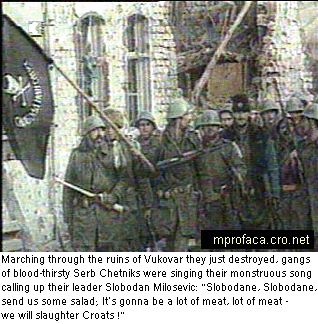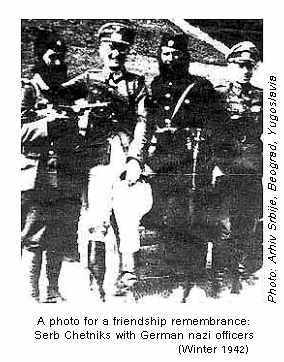|
|
|
|
 Slobodane, Slobodane, Slobodane, Slobodane, šalji nam salate; bi'će mesa, bi'će mesa - klat ćemo Hrvate! ... The first version with the tone and clearly recognised words of Serbian song was shown on NTV and CNN, but also not translated in English.  Just for the history, there is a Serbian Memorial Home Spomen Dom "Ravna Gora" on the right side of the highway Merrillville to Schererville, Indiana, USA, where visitors could see that black flag any time. |
This gem comprises 3000+ pages documenting war crimes in Bosnia. It is probably more useful for historical perspective than provision of current information, as the study was concluded some 18 months before made available. Anyway, it's also one of sources for War Crimes Tribunal
Rape and a campaign of terror to drive people from their homes have
been the Serbians' primary strategies of war in Bosnia-Herzegovina and Croatia.
At least 16 rape camps have been identified by the United Nations and
human rights groups in Bosnia, in addition to numerous concentration
camps and death camps. Such camps have not existed since World War II. |
| The Mazowiecki Reports alternative web site: Final Report of the Commission of Experts Among the major documentations of human rights violations in Bosnia from1992-1995 are the 18 reports compiled by Tadeusz Mazowiecki, SpecialRapporteur to the UN Commision on Human Rights.
| ||||
|
The Christian Science Monitor special single-purpose site, which contains new Monitor stories by David Rohde, Pulitzer Award winner Rohde, The Monitor's Eastern Europe correspondent, was captured on October 29 1995 by the Bosnian Serbs and detained in a jail cell for eleven days. He was released on November 8. Included on the web site is Rohde's personal account of his capture, detainment, and release, the stories he was reporting when he was captured, and the exclusive stories he wrote for the Monitor earlier, detailing evidence of the Bosnian Serbs' massacres of Bosnian Muslim civilians near Srebrenica. The site also includes maps, other documentation of the massacres, and a discussion area which will allow interested readers to add their comments and views on the issues covered on the site. |
